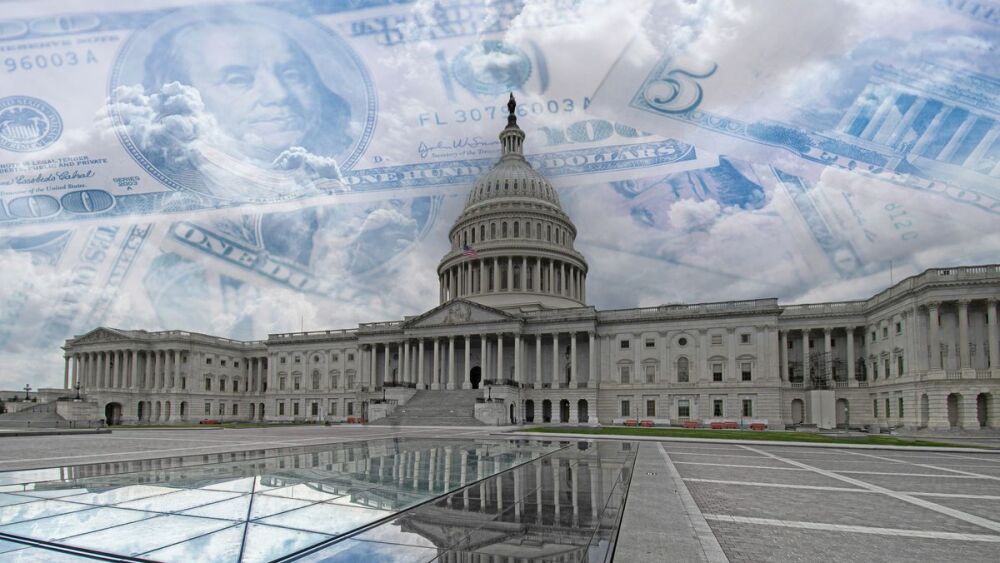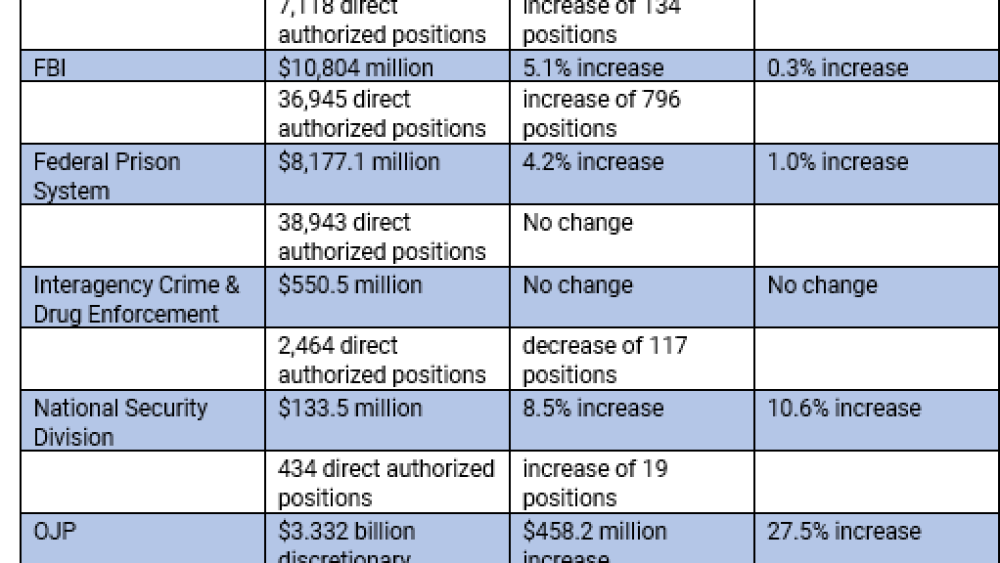By Lexipol’s Grant Services division
In March, President Biden submitted to Congress his budget for Fiscal Year 2023 (FY23). The budget included a total of $37.65 billion in discretionary resources for the Department of Justice, an increase of $2.63 billion over the 2022 enacted budget.
Attorney General Merrick Garland highlighted five significant goals of the proposed budget for 2023:
- Reduce violent crime and gun violence
- Protect national security, including by countering terrorism and fighting cybercrime
- Combat drug trafficking and prevent overdose deaths
- Protect vulnerable communities
- Protect our democratic institutions
The President’s 2023 plan increases funding for the police, allocating more than $32 billion for fighting crime, with $20.6 billion going to the Department of Justice and $3.2 billion in discretionary resources for funding local and state law enforcement. Much of the discretionary funding will be made available for hiring additional police officers. About $30 billion in mandatory resources will “support law enforcement, crime prevention, and community violence intervention.”
The proposed budget directs $17.4 billion for DOJ law enforcement – $1.7 billion for the Bureau of Alcohol, Tobacco, Firearms, and Explosives to crack-down on gun trafficking and $72.1 million for U.S. Attorneys to prosecute violent crimes.
“The President’s Budget would enable the Justice Department to carry out our mission of upholding the rule of law, keeping our country safe, and protecting civil rights,” the Attorney General said. “We will put these resources to work to keep our country safe from threats both foreign and domestic – from terrorism and gun violence to cybercrime and corporate crime.”
2023 Federal Funding for Law Enforcement
The 2023 budget request can be broken down into funding for federal programs and funding for state, local and tribal assistance programs.
Federal funding for law enforcement allocated in the budget includes:
- $10.8 billion for the FBI and $2.8 billion for the United States Attorneys to carry out missions relating to violent crime, cybercrime, hate crimes, terrorism, espionage and the proliferation and potential use of weapons of mass destruction
- $2.5 billion for the Drug Enforcement Administration to combat drug gangs and cartels and to prevent the flow of drugs into American communities
- $1.8 billion for the United States Marshals Service to assist local law enforcement in apprehending fugitives and protecting U.S. judges and courts
- $1.7 billion for the Bureau of Alcohol, Tobacco, Firearms, and Explosives to expand multijurisdictional gun trafficking strike forces with additional personnel, enhance the National Integrated Ballistic Information Network, and modernize the National Tracing Center to build the ATF’s capacity to fulfill trace requests from local, state, federal and international law enforcement agencies
- Funding to expand efforts to protect children from crime and exploitation; fight elder fraud, abuse, and neglect; combat human trafficking; and promote safety and justice in Indian Country
2023 State and Local Funding for Law Enforcement
The 2023 request also makes funding available for state and local law enforcement partners nationwide dedicated to funding the police, preventing crime and accelerating criminal justice system reform.
Office of Justice Programs
$6.2 billion in discretionary and mandatory resources is requested for the Office of Justice Programs. This funding would support longstanding grant programs like Byrne Justice Assistant Grants, Project Safe Neighborhoods and programs that serve victims of crime. The funds would also be used to prevent crime, reduce gun violence, and accelerate criminal justice system reform.
OJP will provide priority consideration for the following items, for which the DOJ has already issued guidance:
- Participation in the collection and reporting to DOJ of data on law enforcement use of force and deaths in custody
- Participation in the collection and reporting to DOJ of data on officer suicides and officers killed and assaulted
- Restrictions on unannounced entries and neck/carotid restraints
- Restrictions on the possession and use of militarized equipment
To receive this consideration, the applicant must describe how they currently support one or more of the identified policy areas within the department.
Community Oriented Policing Services (COPS)
A total of $2.8 billion in discretionary and mandatory resources for the COPS Office to support nationwide hiring of police and sworn law enforcement personnel and the implementation of community-based strategies to combat violent crime.
Office on Violence Against Women
$1 billion is allocated for the Office on Violence Against Women to support Violence Against Women Act (VAWA) programs. This includes programs that provide critical resources to all states and territories to fund police, prosecutors, courts and victim services as well as resources to provide legal assistance for victims, transitional housing, and homicide and domestic violence reduction initiatives.
Protecting Civil Rights
In addition to funding law enforcement and crime prevention, the President’s Budget allocates critical investments to protect civil rights. DOJ would receive $215.2 million for the Civil Rights Division to expand efforts to deter and prosecute hate crimes, safeguard fair elections and combat discrimination. It would also receive $25 million for the Community Relations Service to provide mediation and conciliation services to communities impacted by conflict. An additional $17.8 million for the FBI and $8.2 million for the U.S. Attorneys would bolster their civil rights work and $10 million would go to for the Office for Access to Justice.
Additional allocations include:
- $106.3 million in new funding by expanding, formalizing, and managing body-worn camera programs for the FBI, DEA, USMS and ATF
- $6.5 million in new funding for the Environment and Natural Resources Division’s efforts to advance environmental justice and combat the climate crisis
- Critical investments in the Antitrust Division, the Consumer Protection Branch, the FBI, U.S. Attorneys’ Offices and the Criminal Division to promote economic competition; prevent the theft of intellectual property; deter and prosecute corporate crime; protect the government against fraud; and combat corruption. Among other investments, the President’s Budget would provide a total of $273.0 million for the Antitrust Division to reinvigorate antitrust enforcement and protect consumers.
Finally, the Budget includes resources to ensure the just administration of immigration courts and correctional system. $1.3 billion is allocated for the Executive Office for Immigration Review to reduce the backlog of immigration cases, including supporting 100 new immigration judges, expanding the virtual court initiative, and investing new resources in legal access programming. And $8.2 billion is allocated for the Federal Bureau of Prisons to ensure the health, safety and wellbeing of incarcerated individuals and correctional staff; fully implement the First Step Act and ease barriers to successful reentry; and ensure transparency, accountability and effective oversight of all federal prisons and detention centers.
The Department of Justice offers funding opportunities to support law enforcement and public safety activities in state, local, and tribal jurisdictions to assist victims of crime; to provide training and technical assistance; to conduct research and collect national statistics; and to implement programs that improve the criminal, civil, and juvenile justice system.
More information on DOJ funding
About the author
Lexipol’s Grant Services division is a comprehensive resource for grant information and assistance, providing customized solutions for obtaining funding for essential equipment, personnel and consulting services. Our team of expert grants writers, researchers and project managers helps local government and public safety agencies identify relevant federal, state and private grants, craft successful grant applications and properly manage the funds post-award.



